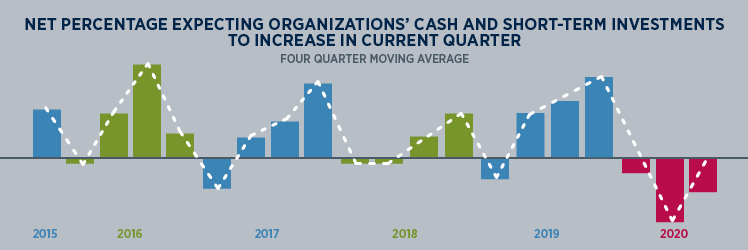In the COVID-19 World, Cash Decisions Are Based on Survival

Employees trying to map out the economic forecast for their company. Financial professionals are unable to determine what the next few months have in store for their organizations because of COVID-19.
Photo: Pexels
Since the Association for Financial Professionals (AFP) first began gathering data via the Corporate Cash Indicators® (CCI), the premise has been that when United States businesses deploy their cash reserves, they are investing in their companies via capital expenditure and increased hiring. These are considered good economic indicators. But in the current environment, companies that are reducing cash are primarily doing so to remain viable.
Cash Deployment on the Rise
Each quarter, AFP asks senior treasury and finance professionals about their company’s cash holdings. According to the latest CCI, companies are increasingly tapping into their cash reserves. More than a third of the 156 survey respondents said they plan to reduce their holdings in the coming quarter, while 28% did so in Q2.
While there are always a few outliers, relatively few companies are reducing their cash reserves to grow their businesses. Instead, the primary driver for reducing cash and short-term investment holdings is a deterioration of business performance (58% for companies who deployed cash Q2 and 51% for companies planning to do so in Q3). A little over a fourth of respondents said they were unloading cash to reduce debt.
Cash Accumulation
While more organizations accumulated cash than decreased it in Q2 — 48% to be exact — most did so as a defensive measure. The quarter-over-quarter index reading was +20, while the year-over-year indicator was +29.
Looking ahead, cash accumulation could be on the decline over the summer, as only about 24% of businesses indicated that they would be adding to their cash reserves in Q3. Those planning to amass more cash are doing so to guard against what they anticipate will be very challenging months. On a slightly encouraging note, about 46% of the companies that are planning to build cash in Q3 said they are doing so due to improved business performance.
If organizations are using cash holdings to stay afloat, it will likely be quite a while before we see any signs of treasury and finance leaders investing in their businesses.
Furthermore, some of the cash increases observed in Q2 were a direct result of the Payroll Protection Program (PPP). With additional stimulus from Congress looking questionable, the 24% of organizations anticipating an increase in cash might prove to be too high an estimate for this quarter.
Safety First
Companies continued their conservative stance in the second quarter, prioritizing safety and liquidity over yield. Twenty percent of organizations were more conservative with their short-term investments in Q2, while only 3% were more aggressive. This cautious stance on investment underscores financial professionals’ uncertainty over the state of the economy.
Analysis and Economic Outlook
COVID-19 continues to be a significant concern in the U.S. With some states experiencing alarming increases in coronavirus cases, there is no clear indication of when the economy will safely reopen for business. Though unemployment numbers reflected some improvement recently, it is extremely hard to predict whether we will see a sustained increase in these figures or improvements in other key indicators. Additionally, the crisis is a global one and therefore travel restrictions are impacting operations of those organizations with a global reach.
The effects of the pandemic have been truly devastating. Some industries, such as hospitality, were more severely impacted, but virtually all sectors saw an impact. If organizations are using cash holdings to stay afloat, it will likely be quite a while before we see any signs of treasury and finance leaders investing in their businesses.
Companies continue to look to their governments for assistance. In the U.S., the Coronavirus Aid, Relief and Economic Security (CARES) Act was enacted as a response to the economic fallout. In the European Union, member states agreed to distribute funds to assist the bloc. But more government assistance will be needed around the globe as the crisis continues to take its toll on individuals and businesses.
Financial professionals are unable to determine what the next few months have in store for their organizations, creating a tremendous sense of unease. What we know for certain is that the next few months will be extremely challenging for businesses globally, and repercussions on most economies will be severe.



